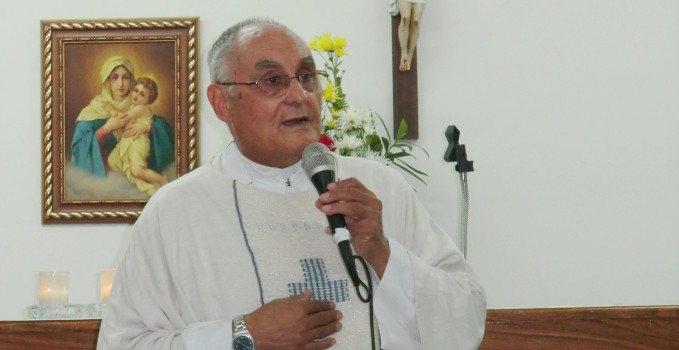ARGENTINA, Fr. Guillermo Carmona, National Director of the Schoenstatt Movement/Argentina •
Dear brothers and sisters in the Covenant of Love,
The motto for the year invites us “to go out to the encounter.” A first assumption to achieve it is to cultivate closeness. We will talk about this in this Covenant of Love letter. Nobody goes out to the encounter without not first getting “close” to others.
1. The source which nourishes our closeness is the experience of Mary who is always close.
She goes out in seach for us and, when she finds us, she shelters us in the Covenant forever. She comes close to us so that we may enjoy her peace and her spiritual harmony.
Mary gives us the awareness of a God who is close to man, who in Jesus becomes one of us. Pope Francis expressed that “this closeness is so great that God manifests himself like a mother who dialogues with her child…..” There is a temptation, the Pope reminded us, which is “to turn grace into a thing, into something.” On the contrary, “this grace is a closeness, a closeness with the intimacy of God.” This God who is always close to us allows us to rejoice in Easter, beyond the sorrowful experiences we suffer or have suffered in the past.
2. Closeness to Mary invites us to be close to others.
What does it mean to be close to someone? When can it be affirmed that closeness exists? When I perceive his joy or his sadness, his serenity or his fear. To be close is to discover the causes for his hopes, fears or anxieties. Dialogues generate attachments and these reveal something of the mystery of him whom we go out to encounter.
Closeness entails the preoccupation for his well-being and his interests. The other person can count on me and viceversa. The true friend is always there, in good times and in bad. If the relationship would only be “casual,” we would not think of calling him on the telephone, send him an email, mention his name or carry the picture of the person within ourself. When you are close, you think about the other person, share truths, clear up doubts, you dream of shared projects.
To cultivate closeness can explode with a trivial question: “What is he doing? What is going on in his life?” From the memory, the search emerges, the desire to pick up the cell phone, to send him a message, to call him or add a wink in the Whats App.
3. To cultivate closeness, one must share feelings.
Sometimes we inhibit emotions and we repress joy or sadness. We become defensive and appear distant. Also before God. Nietzsche feared God and therefore confessed: “One must put dikes on God, he could flood us.” The manifestation of the emotional feeling is important when we decide to go out to the encounter. To share feelings expresses our level of confidence. We do not need to show off: we are authentic, sincere. Formalities are not necessary. When there is closeness, there is the conviction that the other person will not abandon the relationship, even when there is something which does not fit or is out of place or when disappointments arise.
4. Closeness is an expression of our poverty and humility.
The proud and self-suficient person does not have the need to go out to, nor is close to others. “He is full of himself” and closes himself up in his watchtower from where he thinks he can dominate the world, in irony of others and circumstances. Only the poor person – in the sociological and existential sense of the word – is open to enrichment and to allowing himself to be enriched. Closeness is a round trip; I enrich and am enriched; it is the synergy of love and affection.
5. One must also be close to the problems around us.
We know by memory the phrase of our Father and Founder: “With the hand on the pulse of the times…..” In this election year, for example, we want to be close to the political and social problems. It hurts to see so much distance, remoteness and aggression in the world: Andreas Lubitz crashing the plane into the Alps; soldiers and youths murdered in Syria; physical abuse in the streets and avenues of our cities….. All distance, remoteness is a cry against the redeeming love of the Savior.
Mary, our Covenant Partner, inscribes us into her heart and wants us to do the same with our brothers and sisters. It is a way of forgetting the night and of greeting the dawn of Easter.
“Close” to you, I remember you and I bless you,
Fr. Guillermo Carmona
Original: Spanish. Translation: Carlos Cantú, Schoenstatt Family Federation, La Feria, Texas USA














